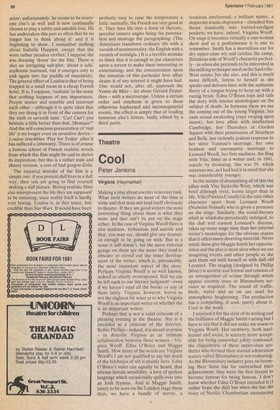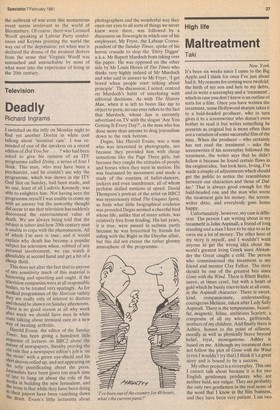Theatre Cool Peter Jenkins
Virginia (Haymarket) Making a play about a writer is no easy task. What most writers do most of the time is write and that does not lend itself obviously to theatre. If they are good writers the most interesting thing about them is what they write and that can't be put on the stage either. In the case of Virginia Woolf there is also madness, lesbianism and suicide and that, you may say, should give any dramatist enough to be going on with. But in a sense it still doesn't, for the more external goings on there are the more they tend to obscure or crowd out the inner development of the writer, which is, presumably, the most important aspect of the story. Perhaps Virginia Woolf is so well known, indeed so utterly overexposed, that we can be left each to our literary judgment — even if we haven't read all the books or any of them lately. Virginia, however, leaves us not the slightest bit wiser as to why Virginia Woolf is an important writer or whether she is an important writer.
Perhaps that is not a valid criticism of a pleasing evening in the theatre. Nor is it intended as a criticism of the director, Robin Phillips — indeed, it is meant as praise — to describe Virginia as an intimate collaboration between three women — Virginia Woolf, Edna O'Brien and Maggie Smith. How many of the words are Virginia Woolf s I am not qualified to say but much of the bitchness of wit is plainly hers. Edna O'Brien's voice can equally be heard, that intense female sensibility, a love of spoken language which occasionally spills over into an Irish feyness. And in Maggie Smith, rarely to be seen on the London stage these days. we have a bundle of nerves, a vivacious intellectual, a brilliant mimic, a desperate manic-depressive — clenched fists thrust frantically into knitted-cardigan pockets; we have, indeed, Virginia Woolf. On stage it becomes virtually a one-woman show and as a performance it is one to remember. Smith has a marvellous ear for dry upper-class wit and catches the camp, flirtatious side of VVoolfs character perfectly — as when she pretends to be interested in the milking technique used on the SackvilleWest estate; but she also, and this is much' more difficult, listens to herself as she speaks and delivers lines with the authentic flurry of a tongue trying to keep up with a racing brain. Edna O'Brien tops and tails the story with intense monologues on the subject of death. In between them we see the coming out of the young Virginia, her rude sexual awakening (rape verging upon incest), her love affair with intellectual Cambridge, her Thursdays at Gordon Square with their processions of Stracheys and Bells, her violently jealous response to her sister Vanessa's marriage, her own hesitant and unromantic marriage to Leonard Woolf, her first madness, the fling with Vita, fame as a writer and, in 1941, suicide by drowning. She was 59, which surprises me, as I had had it in mind that she was considerably younger.
In the nature of dramatising all of this the affair with Vita Sackville-West, which was brief although vivid, looms larger than in life. Vita (Patricia Conolly) is the only other character apart from Leonard Woolf (Nicholas Pennell) who is given a presence on the stage. Similarly, the social-literary whirl in which she periodically indulged, to the dull and earnest Leonard's distress, takes up more stage time than her internal writer's monologue for the obvious reason that it offers more diverting material. Never mind; these give Maggie Smith her opportunities and the play is most alive when we are imagining events and other people as she acts them out with herself or with dull old Leonard. The staging (designed by Phillip Silver) is austere and formal and consists of an arrangement of scrims through which appear country trees or Bloomsbury terraces as required. The sound of traffic, birds, water and so on are used for atmospheric heightening. The production has a compelling, if cool, purity about it. Cool is the word.
I enjoyed it for the style of its writing and the brilliance of Maggie Smith's acting but I have to say that it did not make me warm to Virginia Woolf. Her snobbery, both intellectual and social, is scarcely more acceptable for being somewhat jokily confessed; the cliquishness of these upper-class aesthetes who formed their mutual admiration society called Bloomsbury is not endearing. As the Bloomsbury industry goes on booming their fame has far outreached their achievement; they were the first literati to become famous for being famous. I don't know whether Edna O'Brien intended it (I rather hope she did) but when she has the voice of Neville Chamberlain announcing the outbreak of war even this momentous event seems irrelevant to the world of Bloomsbury. Of course, there was Leonard Woolf speaking at Labour Party conferences and Keynes pointing the world the way out of the depression; yet when war is .declared the drama of the moment derives from the sense that Virginia Woolf was untouched and untouchable by most of what went into the experience of living in the 20th century.







































 Previous page
Previous page